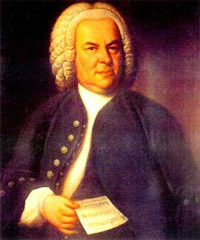Telemann was born in Magdeburg in Germany into a family with
strong links with the clergy. He received no specific musical
education, yet by the age often had learned to play the keyboard,
flute, violin, and zither; by the time he was 12 he had even
written an opera. Unimpressed, his mother confiscated his
instruments and sent him away to school. There, fortunately, the
superintendent was a music theorist, and for the next four years
Telemann outwardly continued to please his family with formal
studies while at the same time developing his understanding of
musical composition.
His education progressed to the Gymnasium Andreanum in
Hildesheim, where he was again lucky in finding a teacher who
encouraged him to compose music for school dramas and for the
local Catholic church. After a spell at Leipzig University
studying law, Telemann settled in Leipzig and wrote a psalm
setting, which was performed at the Thomaskirche and led to an
invitation from the mayor to compose a cantata for every second
Sunday. This annoyed the new Cantor at the church, who tried to
curb Telemann's increasing influence; but it was not long before the
commissions were requested for every Sunday.
In 1702 the young composer founded the Collegium Musicum, with
which he staged regular concerts. The same year he was appointed
musical director of the Leipzig Opera and started to compose
operas, giving roles to some of his students. When a new organ was
installed in the University church he offered his Collegium
Musicum to provide sacred music on feast days.
Telemann left Leipzig in 1705 and briefly held the position of
Kapellmeister to Count Erdmann II of Promnitz in Sorau (now
Poland), composing courtly music in the style of Lully at the
Count's request. In 1708 he became Konzcrtmeister to the Eisenach
Court, leading the court orchestra and writing cantatas and
instrumental music. He took up a post in Frankfurt in 1712 and two
years later married the daughter of a Frankfurt council clerk,
with whom he raised ten children.
In 1721 Telemann was appointed Cantor of the Hamburg
Johanneum,
and eventually became Music Director of the Hamburg Opera. He
increased the city's musical activity by mounting a series of
concerts and operas, including works by Handel. During this period
he composed his three collections of Tafelmusik (Table
Music). As the name suggests, these pieces were to be played as
accompaniment to banquets in noble and middleclass circles. Each set begins with a French-style overture,
followed by a sequence of melodic pieces which could be played in
any order.
Over the years, Telemann's energy declined; but towards the end
of his life, encouraged by Handel — who was a friend of some 50
years' standing — he turned to writing oratorios, a genre m which
he had previously shown little interest. In the course of seven
years, from 1755 to 1762, he wrote six oratorios, including in
1762 Der Tag des Gerichrs
(The Day of Judgment).
These, together with his vast output of 600 Italian overtures, as
well as 47 concertos for solo instruments (21 for violin) and 40
operas, comfortably ensure his enduring reputation.
|



No comments:
Post a Comment